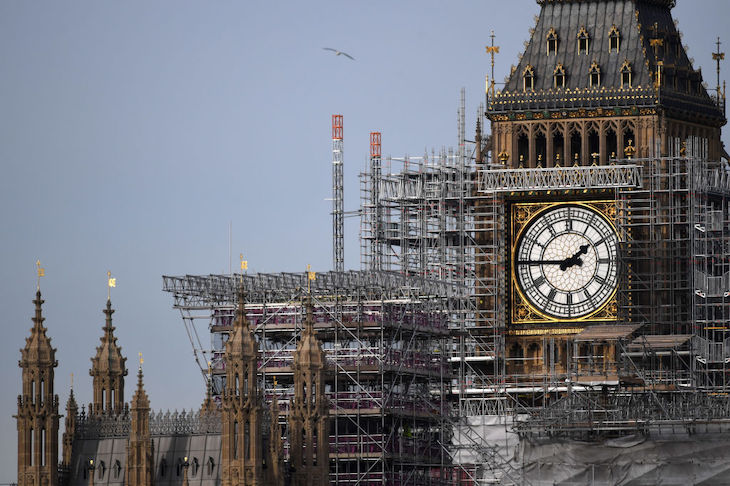Oh look, there’s water coming through the roof of the House of Commons! What a gift to those starved of metaphors for the mess that has been made of Brexit. The problem is that the water coming through the roof, which the House authorities are insisting is not a sewage leak (in a blow to fans of particularly crap metaphors), is far more than some kind of coincidental symbol of what’s going on. It’s actually just a different manifestation of the same problem afflicting British politics as the one that’s led us into the Brexit crisis.
The House of Commons Chamber is the bit of Parliament that the public notice the most, and it’s doing pretty well compared to the rest of the estate. The basement of the main Palace, for instance, has flooded a number of times, while a chunk of masonry fell off another building and onto an MP’s car in 2017. No-one fully knows where all the wires go, which is a worry when at least part of your building has a habit of flooding, and even the shiniest, newest bits, like Portcullis House, have a habit of breaking: glass panes from the roof have shattered, and it’s not unknown for there to be buckets on the floor catching yet more leaking water. Parliament is a World Heritage Site and yet it is crumbling.
One of the reasons it is crumbling quite so dramatically is that successive generations of MPs have failed to take the decision that they know is right: to spend a great deal of money refurbishing the place. The time when this could have happened while politicians went about their business has long passed, and the costs of the project have mounted. And with those rising costs has come a rising sense of panic from MPs about how they can square this with the public. Spend billions of pounds on smartening up an expensive white elephant when firefighters aren’t being paid enough? It’s not difficult to understand why MPs have taken so long to approve a refurbishment programme, something they only did last year. It has long seemed like one of those decisions worth procrastinating on, hoping that another generation of politicians can deal with the public wrath.
Procrastination is a habit politicians fall very comfortably into. So much of their jobs involve taking decisions that are going to mightily annoy at least one vocal group of people. Even announcing huge funding boosts for motherhood generally involves taking money away from some other spending pot like apple pie. Deciding what sort of future relationship Britain should have with the European Union is another sort of decision that will alienate at least half of your own party, not to mention a large section of the public, and so it’s best to wait until you really have no choice but to make a decision, as Theresa May has done.
May has turned a bad habit of dodging decisions into a vice, but she is hardly alone in this. It is just much easier for politicians to avoid taking decisions on aviation capacity, social care, spending billions on refurbishing one of the most famous and beautiful symbols of democracy in the world.
Given that this decision-dodging afflicts parliaments over many generations, you can’t really blame individual MPs. Perhaps it’s also worth wondering whether voters are placing unrealistic expectations on their politicians: that they’ll keep the economy growing while never building anything at all, that they’ll fund a proper social care system without asking anyone to pay anything more, and so on. If they do what they are elected to do, which is to take decisions on voters’ behalf, then those voters often get annoyed either with those MPs directly in their constituencies, or with the party nationally. And so MPs end up being scared of doing their jobs.
And so they don’t fully do them, all the way until water is coming through the roof or they’re about to ask for their second extension to Article 50.







Comments